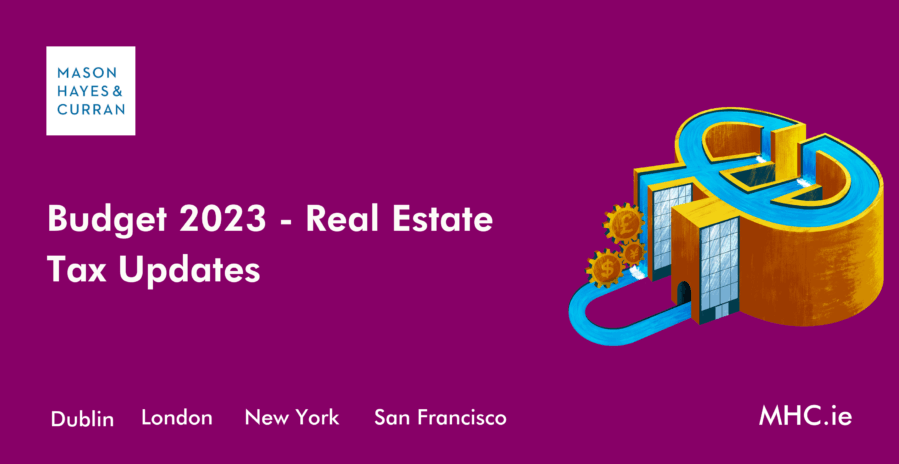
The property market, and in particular the residential property market, has been the focus of much discussion and debate from stakeholders for several years. While the Budget and the Finance Bill did not include significant changes for the Built Environment sector, a number of measures were included aimed at encouraging the development of residential property and increasing the housing supply. We review relevant changes that may impact on developers and property owners in Ireland.
Extension of Residential Development Stamp Duty Refund Scheme
In a welcome development, the Residential Development Stamp Duty Refund Scheme has been extended from 31 December 2022 until 31 December 2025.
The scheme permits a purchaser of non-residential land, which has paid stamp duty at the 7.5% rate, to seek a partial refund of up to 11/15ths of the duty paid, where the land is subsequently developed for residential purposes, within certain parameters. Broadly, the relief can be claimed in the case of a single housing unit or a multi-unit development. In the case of a single housing unit, curtilage of up to one acre can be included in the claim. In the case of a multi-unit development, at least 75% of the relevant land must contain dwelling units.
To qualify for the refund, construction operations must be commenced within 30 months of the completion of the sale. The works must be undertaken in accordance with a local authority commencement notice or 7-day notice, acknowledged by the relevant local authority. The construction must be completed within 30 months of that acknowledgement. A refund relating to a multi-unit development can be claimed on a phased basis.
A clawback, with interest, of any refund granted will apply where the development is not completed in accordance with the relevant conditions.
This scheme is a valuable relief for investors looking to develop residential housing. However, increasingly we have seen more queries and focus by Revenue on refund claims.
Residential Zoned Land Tax
A Residential Zoned Land Tax (RZLT) was announced in last year’s Budget as a measure to encourage building residential homes and increasing the residential accommodation supply. At a very high level, the tax is calculated at 3% of the market value of land within its scope.
Currently, maps are being prepared by local authorities to identify zoned land within the scope of the tax - the first draft maps will be published on the 1st of November. Once published, landowners holding land within its scope can apply to their local authority to have their zoning status reviewed. The recently published Finance Bill has expanded on the detail of the streamlining of this tax. Property owners within the scope of RZLT only have until 1 January 2023 to make a submission to include or exclude their land on the draft maps. It is therefore important that landowners and developers take note of the relevant deadlines and action in good time.
Vacant Homes Tax
The aim of the Vacant Homes Tax (VHT) is to incentivise residential development and increase housing supply. The tax will apply to residential properties which are “vacant” for twelve months or more. Subject to certain exceptions, vacant for these purposes means occupied for less than 30 days in a chargeable period, the first chargeable period for this tax commences on 1 November 2022 and ends on 31 October 2023. For that chargeable period, a VHT return will be due by 7 November 2023 and the tax will be payable by 1 January 2024 under the self-assessment system.
Generally, the tax will be charged at a rate of three times the property’s existing base local property tax. For example, for a property valued at €900,000, a VHT in the region of €2,835 would be expected based on the details set out in the Finance Bill.
Other Measures:
- REIT and IREF regimes - a review will be undertaken of both regimes to consider how they can best continue to support housing policy objectives.
- The maximum tax deduction which may be claimed for pre-letting expenses on vacant residential properties is being increased from €5k to €10k. The eligible vacancy period is being reduced to 6 months.
- A 5% levy on certain concrete products as a measure to part fund the Defective Concrete Blocks Redress Scheme will come into effect from 1 September 2023.
- Rent Tax Credit - a new rent tax credit of max €500 per annum, (€1,000 in the case of joint assessed couples) is being introduced for tenants in the private rented sector, claimable in the years 2023 to 2025. It will also be possible to claim the credit in early 2023 in respect of rent paid in 2022.
- The Living City Initiative is being extended for a further 5 years until 2027.
- Tenants of properties owned by non-resident landlords will be required to provide additional information to Revenue regarding tax withheld on rental payments. In addition, collection agents will not be chargeable to tax on rental income on behalf of non-resident landlords if the agent remits withholding tax of 20% from the rental payments and provides certain information to Revenue.
- The Bill includes a number of amendments to stamp duty:
- Clarification that the higher rate of stamp duty of 10% (which applies to the acquisition within 12 months of 10 or more residential units) applies where a partial interest in a residential unit is acquired.
- An exemption from the 10% rate of stamp duty where a residential unit is acquired by a home reversion firm under a home reversion agreement authorised by the Central Bank of Ireland.
- Provision for the full repayment of stamp duty where residential property is acquired and sold within 12 months to provide affordable housing under the Affordable Housing Act 2021, subject to certain conditions.
- Amendment of existing provisions for the partial repayment of the 10% stamp duty rate where, subject to certain conditions, the property is subsequently let to an approved housing body for social housing purposes, designated as a cost rental dwelling, or registered as a centre providing care for those in the community with special needs or children in care.
Conclusion
The tax announcements in Budget 2023 and Finance Bill 2022 relevant to the Built Environment sector were focused on the supply of housing stock. The extension of the Residential Stamp Duty Refund Scheme in particular, for a further three years is a positive. However, the introduction of the VHT and the development of the RZLT rules will be less welcome.
Property owners who may come within the ambit of the VHT and owners of lands zoned under the RZLT should review and take appropriate steps to understand whether they fall within the scope of these taxes and consider whether, or not, further steps are required at this stage.
For more information regarding these measures and their likely impact on your organisation, contact a member of our Tax team.
The content of this article is provided for information purposes only and does not constitute legal or other advice.





